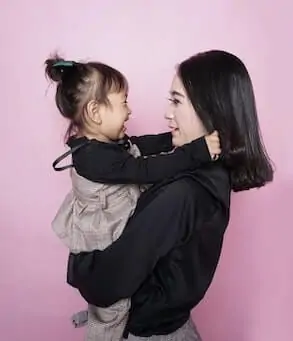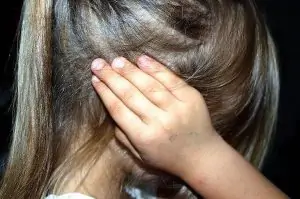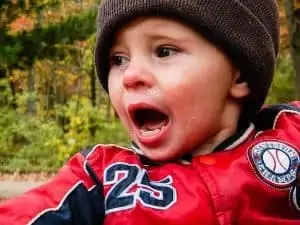Let me paint a picture for you…you’re sitting in your living room, gathered with the rest of your family – cousins, grandparents, etc. Your toddler comes into the room, and everyone is so engrossed in their conversations that he feels left out. After all, he’s the youngest.
He tries to get attention, but no one listens. So, he does what he thinks is a smart move in his developing brain…he starts hitting himself.
Suddenly, everyone gives him a reaction. Grandma gasps. Grandpa tells him, “No, sport. Don’t hit yourself.” And your toddler gobbles up all the attention.
Sound familiar?
If you have a toddler at home, you know how they will do anything – positive or negative – to get attention.
Of course, I’m sure you’re wondering if a toddler hitting himself in the head might be cause for concern. Sometimes your toddler hits himself when mad. I have a friend whose toddler bangs his head on the floor when upset.
Toddlers hitting and biting are pretty normal behaviors in this age group. A toddler who hits himself when told no is another common reaction. They know it concerns you and that attention is what they’re seeking.
Fortunately,
I didn’t have the whole toddler-hitting self type of phase. My girls usually just screamed, wailed, and kicked their legs on the floor until they realized this wouldn’t get them anywhere.
So now, read on to find out what to do when your toddler hits himself in the face!
Why do toddlers hit themselves in the head?
If your toddler is hitting his head with hand, that toddler is hitting himself in anger, trying to soothe, wanting a reaction, or something else is going on. I will delve into these deeper so you can determine why your toddler is hitting himself.
Toddlers have zero communication skills
Toddlers feel all the same emotions we feel. They feel angry, jealous, fearful, confused, frustrated, happy, and sad. However, toddlers don’t have the same vocabulary as we do just yet. They can’t just come right out with it and say, “I’m angry because you’re not paying any attention to me! You’re all having boring conversations, and no one is talking to me.”

Of course, if they could communicate this way, it would be much simpler. But they can’t. So whatever big emotion they’re feeling inside, they express themselves by hitting themselves in the head or face or even banging their head and the rest of their body on the floor.
Sometimes, when toddlers hit themselves, they are annoyed that they can’t communicate whatever they feel. So they take that frustration out on themselves.
It may be a form of self-soothing
For some children, that need for physical, sensory action is greater than others. And others may have a dulled sense of pain. For these children, hitting themselves fulfills that need. They may find comfort in repetitive physical motions when tired or upset.
It instantly commands your attention and a reaction
If you haven’t noticed, toddlers are a bit focused on themselves. They won’t always be this way, but they don’t have the capacity at this age to understand the world doesn’t revolve entirely around them.
As such, your toddler loves when they’ve got your full attention. So, they’ll do about anything to ensure you’re a captive audience. If you made a big reaction when they started hitting themselves, guess what? They’re going to keep on doing it. Remember, watch how you react to your toddler. Good or bad behavior, they will repeat it over and over when they get a reaction.
It’s not always negative, though. Some toddlers are natural-born comedians, and if they were hitting themselves to copy the behavior and everyone laughed, they would keep doing it to get everyone laughing again.
They might be in pain
If this behavior comes out of nowhere and your child seems upset, a toddler hitting himself may indicate something is wrong. It could be teething, an ear infection, or the onset of an illness. So, if something seems off about your toddler, check to see if they have a fever or find out if they are in pain. They will likely stop this behavior if you help them resolve whatever is hurting them.
Is headbanging always a sign of autism?
You can breathe a sigh of relief here. Just because your toddler hits himself in the head doesn’t mean autism. The signs of autism in toddlers usually start well before this, and while repetitive behaviors are one of them, that’s not enough to make a diagnosis.
Like all the others, you will likely see that this is just a phase your toddler is going through. When your toddler becomes more adept at communicating, soothing themselves, or getting their desired attention, they will stop hitting themselves.
So, don’t worry that your child is autistic if they develop as expected in all the other areas. But if your child hits themselves regularly, can’t make eye contact, doesn’t want to interact with others, or has delayed motor skills or speech, you will want to make an appointment with your doctor to get to the bottom of things.
Is this normal?
Again, when your toddler hits himself in the face, it’s most likely a phase. They’ll grow out of it more quickly if you help them with some coping tools to get through it.
As a mom, I know what it’s like to flounder with the “what ifs” and “how do I know” that come with being a parent. So, if you’re wondering if you need a specialist or a doctor on this matter, go through this checklist:
- Your child’s behavior continues even though you’ve tried different strategies
- Their behavior gets worse
- They’re really hurting themselves with physical injuries like bruises and scratches
- Your child’s speech is delayed
- Your child doesn’t seem to hear you clearly
- They are showing signs of having a physical illness (fever, fatigue, etc.)
- Your child shows the other signs of autism spectrum disorder or a sensory processing disorder
If any of these apply, then you should certainly give your doctor a call. Even if it’s nothing, you’ll have the peace of mind to finally not worry about it anymore. And, should something actually be wrong, you’ll likely be referred to a specialist who can help you through this.
How do I get my toddler to stop hitting himself?
So, now that we know why your toddler might be hitting himself and when it’s cause for worry, how do you make them stop?
Even if you think it could be worse, you must engage with short-term solutions to keep your child from hurting themselves.
I once met a mom at a playground when my girls were much younger. We got to talking while our kids played merrily. Her toddler son came up to her and asked for a juice box. When the mom realized she’d forgotten one, he started punching himself in the face.
Other moms were aghast, but I knew what was going on. I had a couple of extra juices in my bag, so I offered him one, and the behavior stopped. “Thank you so much! He keeps hitting himself like this. The lady at the daycare almost accused me of child abuse until she saw him hitting himself in the face,” she’d told me.
I was happy to share my tactics with this mom than as I am now with you. 🙂
Prevent injuries
If your toddler is in this phase, it is wise to protect from injuries. In case you haven’t yet safeguarded sharp corners in your house, now is the time. You can find those foam corner bumpers or these more subtle ones. I still have them on the windowsills in my daughters’ rooms because they’re near their beds, and I don’t want them smacking their heads when they flop down onto the bed.
What if your child is actively hitting themselves? Wrap your arms around your child in a firm but not-too-tight way. This will keep them from harming themselves.
Ignore them
If your child isn’t causing any bruising or physical damage and is in no apparent danger, you can safely ignore them. This is a great option when toddlers try to get your attention because if you don’t reinforce the behavior, they’ll grow tired of this act and stop doing it.
Ensure physical needs are met
What if your child isn’t just seeking attention? If your child is in pain, needs sensory input, or is very frustrated trying to communicate with you, you need to see what you can do to make them more comfortable.
Watch for patterns.
If your child hits themselves when their diaper is wet, you can make a preemptive strike to check out the diaper at these times and help change them. When your child’s needs are met, they’re less likely to hit themselves.
Send them in a new direction
Children need our guidance and direction to learn how to express feelings properly. I’ve always told my girls that we can feel our emotions. Everyone has feelings, and no one has the right to tell you how to feel or how you should feel.

That said, we need to learn appropriate ways of expressing those feelings. My girls laughed when I acted out scenarios because they thought seeing a grownup throwing a tantrum was funny. Silly as I was, it proved my point. When they’re angry, both will use the same tactics I taught them for expressing anger and asking for help when moving through it.
I’ve taught them to take a break and return when frustrated with a project. Hitting a pillow is a good idea too. I also give them things they can squeeze, like play-dough. It feels really good to strangle that stuff.
Let them know you understand
Your toddler just wants you to understand them. So let them know that you get it. “I know you’re angry because your block set tipped over. You worked so hard on it. I can help you pick it up, and we can start over again.” It’s really that simple to validate their feelings and show you care. That’s what they need to hear.
If your toddler asks you for a cake for dinner and you say no (and rightfully so!) and they start hitting themselves, you can tell them you get how frustrated they are and wish you could have cake for dinner too. This puts you on their level. When they calm down, you can explain why cake isn’t a proper meal and how soon you can enjoy some cake together for dessert.
Teach them what to call those feelings
The trouble with toddlers and feelings is that they can feel them, but they have no idea what they’re called. You can role-play with their stuffed animals, label your own emotions, or get picture books that appropriately tackle the topic.
One last thing about toddlers hitting themselves…
A toddler hitting themselves in the face or head is definitely strange, but it’s not uncommon. It’s all part of development. When you deal with their communication issues and needs, you’ll find ways to stop them from doing this.
Most kids grow out of this independently with the help of problem-solving behaviors like the ones I’ve detailed above. Schedule an appointment with your doctor if you notice any other unusual behavior or symptoms.
Leslie Berry lives with her husband and two young daughters in Los Altos, California, where she loves helping other moms get comfortable with motherhood and embracing the insanity with facts peppered with laughs.
She loves eating too much sushi, exercising, and jamming out on her Fender. Read more about Leslie here.






